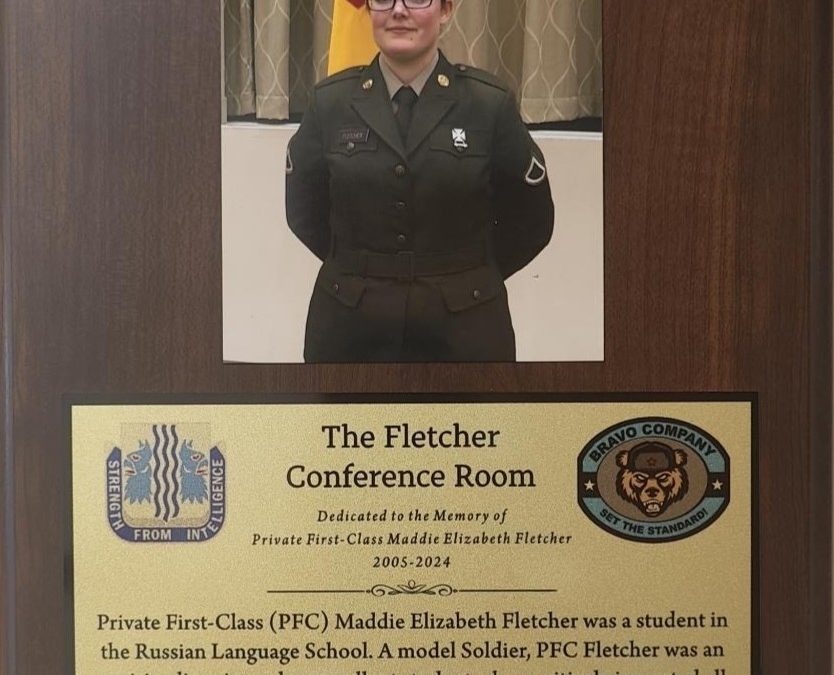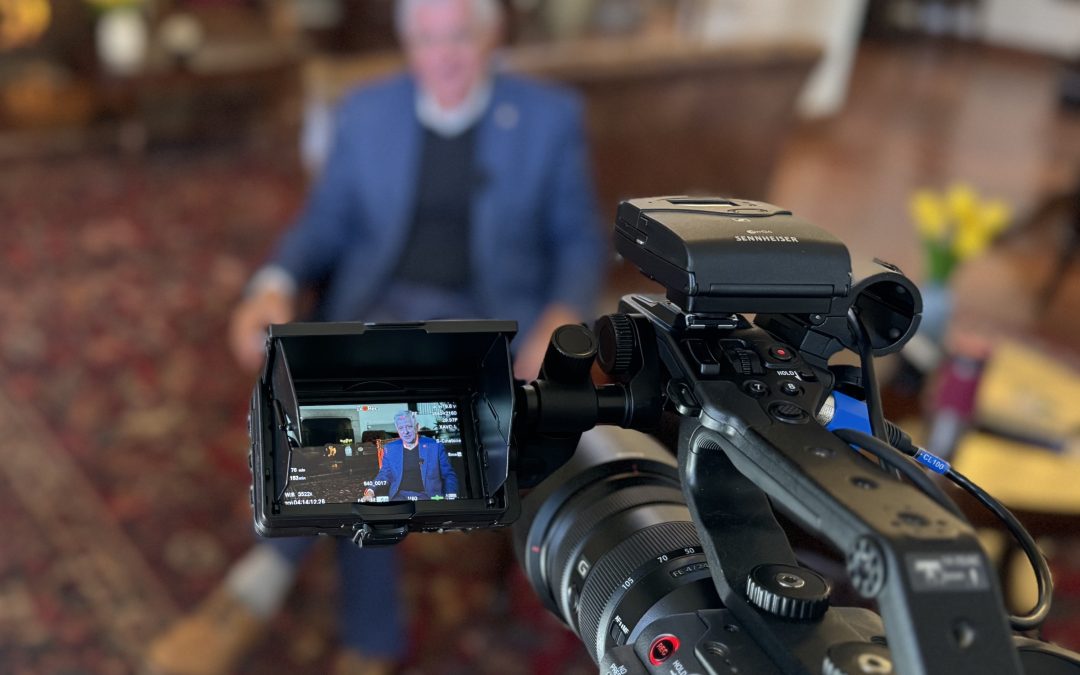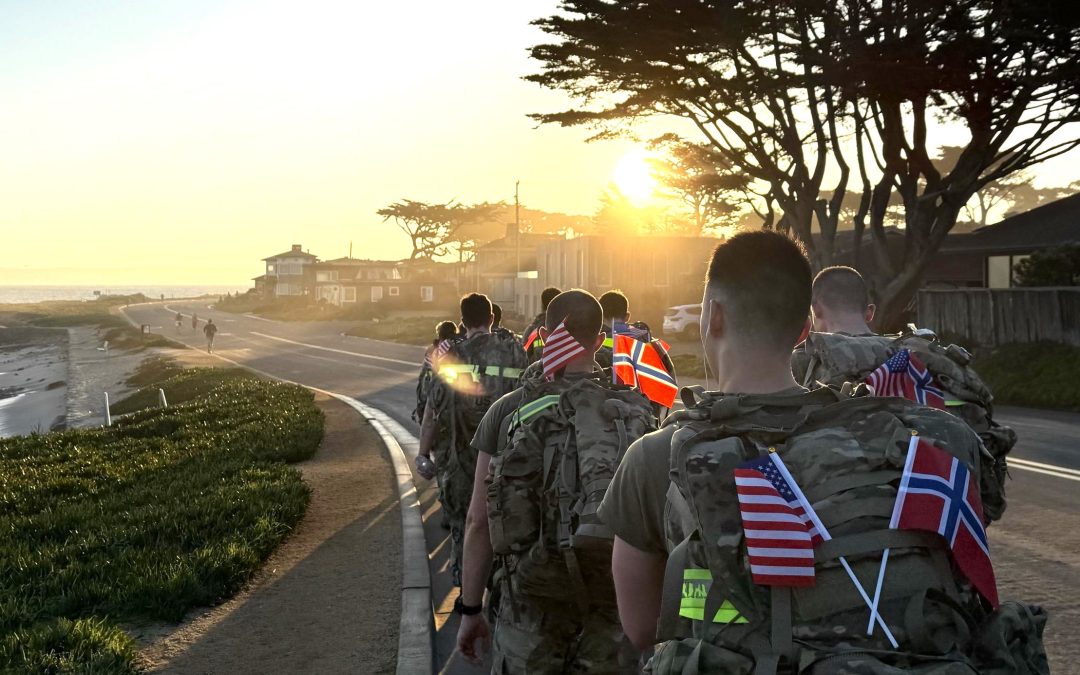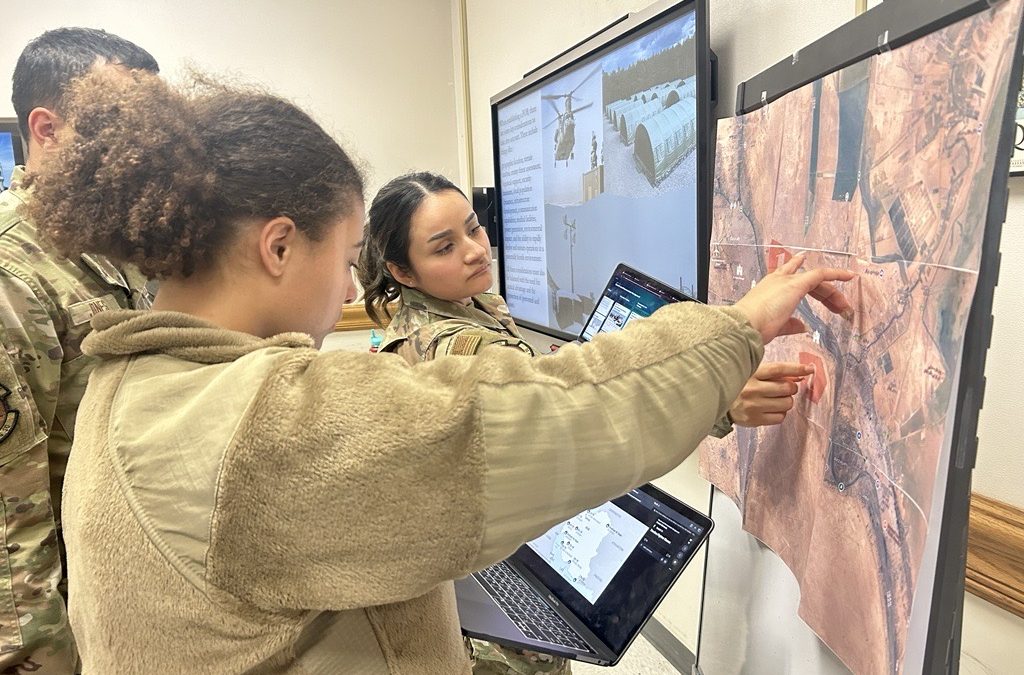By Patrick Bray
DLIFLC Public Affairs

Master Sgt. Mike Gabino, noncommissioned officer in charge of Undergraduate Education at the Defense Language Institute Foreign Language Center, smiles with the joint-service color guard in the background prior to a change of responsibility ceremony for the institute’s Command Sergeant Major at the Presidio of Monterey, California, June 3, 2016. (Photo by Amber K. Whittington, DLIFLC Public Affairs)
MONTEREY, Calif. – Though the U.S. Army has taught him much, if there is one thing in particular that Master Sgt. Mike Gabino has learned from the Army is that everybody has the ability to learn if you have the right instructor. That is why he strives to be the “right instructor” to his Soldiers as he gives back what the Army has given to him – opportunities.
Gabino is fluent in Spanish and has served in the Army since 1993. He is the noncommissioned officer in charge of Undergraduate Education at the Defense Language Institute Foreign Language Center at the Presidio of Monterey, California, which is regarded as one of the finest schools for foreign language instruction in the Nation. All basic foreign language teaching at the institute takes place in undergraduate education.
“Part of being an NCO is to be a teacher able to coach, mentor and develop others,” said Gabino, which is standard throughout the Army, but at DLIFLC the stakes are higher.
Considered one of the toughest challenges in the Department of Defense, the language school places enormous pressure on students from across the services – Army, Marine Corps, Navy and Air Force – to succeed in only a limited amount of time. Proficiency standards for military linguists are high and getting higher. Students spend up to seven hours a day in class, followed by three hours or more of homework each night. Weekends are filled with extra studying, and that does not include the day-to-day requirements of being a service member. Dependent upon the language being learned, this routine can go on for six months to a year and a half. It is easy to see how students might feel stressed and overwhelmed.
Gabino meets regularly with the institute’s Military Language Instructors, qualified NCOs who teach students in their language and serve as an example to them. MLIs bridge the gap between the military units and the civilian staff in all eight schools and languages taught at DLIFLC.
“I use a lot of my experience as a student in the military to mentor the MLIs,” said Gabino, and he expects the MLIs to do the same for their students. “Experience is the foundation of what I became and it taught me what right looks like.”

Master Sgt. Mike Gabino (right), noncommissioned officer in charge of Undergraduate Education at the Defense Language Institute Foreign Language Center, speaks with Military Language Instructors, qualified NCOs who teach students in their language and serve as an example to them, prior to a graduation ceremony at the institute on the Presidio of Monterey, California, Sept. 15. (Photo by Patrick Bray, DLIFLC Public Affairs)
Gabino wants students to realize that with hard work and dedication they can get through one of the most challenging schools in the military. For students who may be struggling, Gabino tells them that “you’re never out until you’re out. Don’t ever quit on yourself, but let the process run its course. Don’t jump the gun and make that decision to quit.”
With the enormous amount of effort that must go into being proficient in a foreign language it can be easy for students to adopt a mindset of constant studying. Fully understanding the push to succeed, Gabino realizes that “part of the learning process is knowing when to take a break and go out and decompress.”
Therefore, Gabino initiated programs to help students take their minds off classes for a while. One such program is a module-based, mixed martial arts class that includes Jujitsu, Judo and Taekwondo. He worked with the institute’s leadership to set up the program so that it would not interfere with language class times and that a mixed martial arts class would be available if a student wanted to take it.
“Not only are they learning a new skill but they’re forgetting about class for a little while. They’re decompressing,” said Gabino. “Creating a balance is part of the learning cycle.”
As a former boxing coach and a level 2 certified combatives instructor, Gabino has incorporated mixed martial arts programs at every unit where he served if there was not one already in place. He has seen these programs produce positive results. He is also a proponent of the Army’s performance triad, which is an initiative that promotes better health through adequate sleep, exercise and nutrition, and he wants students to incorporate this into their daily habits.
“We’ve got people that are physical so they like to do physical stuff,” Gabino added. “But we’ve also got people that are more open to being mentally stimulated. So we incorporated the student learning center to be open seven days a week so they can use it and its resources as they see fit.”
The student learning center allows students to study in a more relaxed atmosphere than the library or classrooms and does not necessarily have to be used for only language study. Students can spend time there reading, get tutoring, attend workshops and watch foreign language movies.
“I think it’s important to give back. Our students go through a lot. We have some of the best students that we could ask for in the military regardless of service,” said Gabino.
The majority of students at DLIFLC are initial entry training service members with age ranges from 19 to 23 and of a different generation than Gabino and the senior leadership at the institute. This requires empathy and understanding in order to mentor a younger generation. For example, although some DLIFLC students have attended college, most have not taken courses beyond high school and many are lacking adequate study and time management skills. These are things that Gabino wants to ensure the students do pick up through the course of their language training. Therefore, he works with NCOs to teach time management to the students. Overall, he wants to ensure that service members’ needs outside of class are being met and ensure a positive work-life balance.

Master Sgt. Mike Gabino (second from right), noncommissioned officer in charge of Undergraduate Education at the Defense Language Institute Foreign Language Center, enjoys a whitewater rafting trip in Northern California with his wife, Evelyn, and their two sons June 5, 2016. Gabino mentors Soldiers and other NCOs at the institute and also strives to inspire younger people as he volunteers in the community in Monterey, California. (Photo courtesy Master Sgt. Mike Gabino)
Gabino is also a student of his own guidance. When he is not at work he spends time enjoying his three favorite hobbies: watching movies, dancing, and enjoying restaurants with his family. He is very family oriented and takes advantage of Monterey’s scenic coastal location to do things with them. He is proud of his two children for being as adventuresome as he is. They take flight lessons and occasionally go scuba diving and skydiving together.
Gabino is also a volunteer with the Boys and Girls Club of Monterey County and tries to inspire them to achieve as he does with his DLIFLC students and Soldiers. He strives to inspire and present himself as a role model for the club members to emulate.
“I told the kids that it doesn’t matter where you come from. You can make it,” said Gabino during a speech to the club in August 2016.
As a mentor to so many people Gabino understands what it is like to endure struggles. He went through them himself and then some.
From Fajardo, Puerto Rico, Gabino joined the Army Reserves as an orthopedic technician in 1993 so he could pay for his college education. At the time he only knew Spanish. So the Army sent him to the Defense Language Institute English Language Center in San Antonio, Texas.

Master Sgt. Mike Gabino, noncommissioned officer in charge of Undergraduate Education at the Defense Language Institute Foreign Language Center, speaks at the Boys and Girls Club of Monterey County, California, Aug. 25, 2016. “I told the kids that it doesn’t matter where you come from. You can make it,” said Gabino. He mentors Soldiers and other NCOs at the institute and also strives to inspire younger people as he volunteers in the local community. (Photo courtesy Master Sgt. Mike Gabino)
In 1997 he went on active duty switching jobs to become a cryptologic linguist. Then the Army sent him to study Russian at DLIFLC in Monterey. One night he went out late to buy baby formula when he was hit by a drunk driver. Facing a lengthy recovery, he was medically dropped from the Russian course. Later, Gabino was given the option to return to his Russian studies, but he would have to start from day one.
“At that point I had been at DLI for almost two years. So I asked them to reclassify me as a Spanish linguist,” said Gabino. He took the Defense Language Proficiency Test and qualified as a linguist.
From there Gabino served successfully in the 82nd Airborne Division at Fort Bragg, North Carolina, and the 205th Military Intelligence Battalion at Fort Shafter, Hawaii, as a Spanish linguist. He earned a Master of Arts in Administration with a concentration in leadership from Central Michigan University and is working towards a doctorate in organizational leadership from the University of the Cumberlands in Williamsburg, Kentucky.
“That hunger for education came from the Army,” said Gabino. “That’s when I became really passionate about learning new skills and teaching those skills to others.”
Today, reflecting back to what the Army taught him about learning from the right instructor, being a teacher and mentor, Gabino recalls learning how to draw when it was part of his job requirements that he should draw.
“I used to be bad at drawing. Bad at drawing,” Gabino said with a laugh. “Well guess what? In one day with the right instructor she taught me how to draw. I never knew I could draw!”
Gabino has been at DLIFLC since 2015. He has also served as the interim Garrison Command Sergeant Major for the Presidio of Monterey for more than 60 days during summer 2016.

Master Sgt. Mike Gabino, noncommissioned officer in charge of Undergraduate Education at the Defense Language Institute Foreign Language Center, enjoys dancing with his wife, Evelyn. When he is not on duty at the institute, Gabino enjoys his three favorite hobbies: watching movies, dancing and enjoying restaurants with his family. Gabino mentors Soldiers and other NCOs at the institute and also strives to inspire younger people as he volunteers in the community in Monterey, California. (Photo courtesy Master Sgt. Mike Gabino)
This year, DLIFLC celebrates its 75th anniversary. The institute provides resident instruction in 23 languages at the Presidio of Monterey, California, with the capacity to instruct another 65 languages in Washington, D.C., graduating more than 220,000 linguists since 1941.
In addition, multiple language training detachments exists at sites in the U.S., Europe, Hawaii and Korea, spanning all the U.S. geographic combatant commands, in support of the total force.




